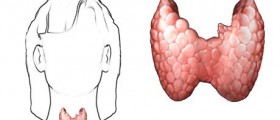
Introduction
The thyroid gland is situated in the neck. It is in charge in production of three hormones, thyroxin, triiodthyronine and calcitonin. Thyroxin and triiodthyronine are of great importance in regulation of metabolism.
All the diseases related to problems in production of thyroid hormones can be divided into hypothyroidism and hyperthyroidism.
Hypothyroidism
Hypothyroidism is a condition in which thyroid gland does not produce sufficient amount of thyroid hormones. This consequently leads to specific changes in metabolism. Namely, the metabolism slows down and patients report prolonged fatigue, constipation and weight gain. Patients also complain about pain in joints, dry skin and they feel cold. Many patients also develop depression if the condition is left untreated.
This medical condition is more frequent in women. Women who are suffering from hypothyroidism may also have difficulties in getting pregnant and in case that a woman eventually conceives the risk of complications during pregnancy also rises if the diagnosis is not set on time.
Hypothyroidism is successfully treated with thyroid hormone medicine.
Hyperthyroidism
Hyperthyroidism features with excess of thyroid hormones. The levels of thyroid hormones are way too high and this reflects in accelerated metabolism.
The symptoms of this medical condition include shaking of the hands, increased perspiration and rapid heart beat. Rapid metabolism also leads to loss of weight even though patients report they eat more food than usual. They also report excessive hunger. The patients are always feeling hot even during cold winter months. Additionally, they become nervous and anxiety occurs.
If left untreated hyperthyroidism may lead to protrusion of eyeballs and sometimes induce severe arrhythmia or even myxedema. Women suffering from hyperthyroidism also suffer from infertility.
Thyroid Problems after Pregnancy
Certain percentage of women may develop diseases of the thyroid gland in postpartal period. The risk of this increases in women who are already suffering from some other conditions such as type 1 diabetes. Basically, the initial problems occur within 3 to 6 months after the childbirth. Problems with the thyroid gland can also occur in women who have experienced a miscarriage.
The disease in the beginning features with hyperthyroidism and it eventually turns into hypothyroidism. Luckily, in most women the problem is not permanent and lingers only for a while. In this case the treatment is not necessary. Still, it is significant to be diagnosed. The proper diagnosis is essential because many doctors may think that woman is suffering from postpartum depression while she is only having transitory problems with thyroid gland.











-In-Adults_f_280x120.jpg)




-In-Infants-And-Older-Children_f_280x120.jpg)
Your thoughts on this
Loading...